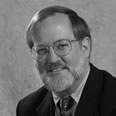Randolph Martin Nesse

Randolph Martin Nesse, M.D., is Professor of Psychiatry and Professor of Psychology at the University of Michigan, where he directs the Evolution and Human Adaptation Program. He collaborated with George Williams to write several seminal works on Darwinian medicine, including Why We Get Sick: The New Science of Darwinian Medicine. His early research into the neuroendocrinology of anxiety has evolved into a focus on how selection shapes mechanisms that regulate defenses such as pain, fever, anxiety and depression. He is devoted to encouraging doctors and researchers to apply evolutionary insights to diverse areas of medicine and to helping organize the growing Evolution and Medicine community via EvolutionAndMedicine.org and The Evolution & Medicine Review http://evmedreview.com.
8 April / MEDICINE WITHOUT EVOLUTION IS LIKE ENGINEERING WITHOUT PHYSICS
While evolution offers some direct applications in medicine, its more powerful utility is the same as what physics offers for engineering - a foundation in basic principles that explain why things are the way they are.
Larger investments in evolution education for physicians pay off in three ways. First, researchers who already use some evolution find greater power as they have opportunities to learn the details; infectious disease and genetics offer good examples.
Second, new answers come from asking new evolutionary questions about why the body is the way it is; studies of gout, bilirubin, gender differences in mortality and depression are good examples.
Third, and perhaps most important, is replacing the outmoded metaphor of the body as a machine with a more biological model of the body as a bundle of tradeoffs shaped by natural selection to maximize Darwinian fitness.
Medicine can be practiced without evolution, and engineering without physics, but only at a great loss in depth of understanding.
D I S C U S S A N T S
Daniela Minerva born in Bologna in 1958, she earned a degree in Philosophy of Science at the University of Bologna and in 1984 a Master in Science Communication at the University of California.
She is currently editor of the health and medicine section of “L’Espresso”, and a member of the board of directors of the Master in Science Communication at the Università di Roma La Sapienza.
Her most recent book is La fiera delle sanità (Rizzoli-Bur, Milano 2009).
She is also author of: Il potere degli ingegni (with Carlo Bernardini), Sansoni, Firenze 1992; La ricerca di Eva.
Viaggio all’origine dell’uomo moderno (with Fabrizio Ardito), Giunti, Firenze 1995; La leggenda del santo guaritore.
Il caso Di Bella, Editori Riuniti, Roma 1998; No Aids - Globalizzare la salute (with Stefano Vella), Avverbi, Roma 2001; Di cosa parliamo quando parliamo di medicina (with Giancarlo Sturloni), Codice, Torino 2007.
Stefano Salvioli was born in Carpi (Modena) on April 16, 1966.
In 1991 he graduated “cumlaude” with a degree in Biological Sciences from the University of Modena and Reggio Emilia, with an experimental thesis on immunology.
In February 1999 he earned his PhD in Experimental Pathology at the University of Bologna, where he has been an Assistant Professor since January 2005.
His research interests regard mainly human ageing and in particular the study of the role of mitochondria and the p53 gene in successful ageing.
He teaches Immunogenetics at the Department of Pharmaceutical Sciences of the University of Bologna. Salvioli has written or co-written more than 70 original articles for peer-reviewed journals.
He is also interested in anticipatory literature, especially in relation to the life sciences.